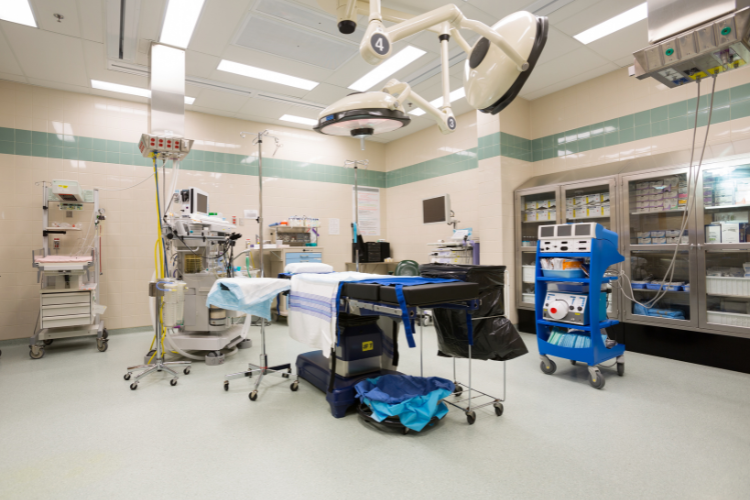Last Updated on July 31, 2024 by Laila Oliveira
Moving to a new country can be both thrilling and daunting. This is true, especially when it comes to healthcare. Are you worried about accessing healthcare in Spain as an expat?
You’re not alone! Spain offers one of the most comprehensive and accessible healthcare systems in the world, ensuring that all residents, including expats, receive top-notch care. Imagine having peace of mind knowing that high-quality medical services are just a step away, no matter where you live in Spain.
From registering with local health centers to understanding the costs and benefits of public and private healthcare, we’ve got you covered. Dive in and discover how Spain’s healthcare system can provide you with the security and support you need.

Public Healthcare in Spain
Spain’s public healthcare system, the Sistema Nacional de Salud (SNS), offers comprehensive medical services to residents. Here’s what you need to know about accessing public healthcare in Spain.
Spain’s public healthcare system is one of Europe’s most extensive and efficient. Funded through taxes, the SNS ensures that all residents have access to essential medical services. These services include general practitioner consultations, specialist appointments, hospital care, and emergency treatment. The system also covers various preventive measures, including vaccinations and health screenings.
The SNS operates a network of health centers and hospitals spread across the country.
These facilities are equipped with modern medical technology and staffed by skilled professionals. Residents can access primary healthcare at local health centers, while specialized treatments and emergency care are available at public hospitals.
This comprehensive network ensures that medical services are within reach for everyone, regardless of their location.
Public healthcare in Spain also emphasizes accessibility and equity. The system is designed to provide equal healthcare opportunities for all residents, including expatriates.
It covers a broad range of medical needs, from routine check-ups to complex surgical procedures. Additionally, the SNS supports various health programs targeting different demographics, such as maternal and child health, senior care, and mental health services.
Health Centers
Health centers, or “centros de salud,” are your primary point of contact for healthcare services.
These centers offer general medical consultations, pediatric care, and preventive services. They are conveniently located throughout cities and towns, making it easy to find one near you.
Here are some notable health centers in major cities:
| City | Health Center |
|---|---|
| Madrid | Lavapiés Ibiza Fuencarral |
| Barcelona | Drassanes Les Corts Sagrada Família |
Valencia | Barrio del Cristo Benimaclet Fuente de San Luis |
Seville | El Porvenir Amante Laffon Ronda Histórica |
| Málaga | El Palo La Trinidad CPuerta Blanca |
These centers provide a wide range of services, ensuring that residents have easy access to primary healthcare.
Public Hospitals
Public hospitals in Spain are well-equipped and staffed with highly trained medical professionals.
These hospitals provide specialized care, emergency services, and advanced medical treatments.
While public hospitals may have longer waiting times compared to private facilities, they offer high-quality care at minimal or no cost to residents.
Here are some of the top public hospitals in major Spanish cities:
Madrid
- Hospital General Universitario Gregorio Marañón: This hospital is known for its cutting-edge medical treatments and comprehensive healthcare services. It offers specialized care in cardiology, oncology, and neurology, among other fields.
- Hospital Universitario La Paz: Renowned for its pediatric and maternal care, La Paz also provides excellent emergency services and advanced surgical treatments. It is one of the leading hospitals in Spain for medical research and innovation.
Barcelona
- Hospital Clínic de Barcelona: This hospital is internationally recognized for its excellence in medical care, particularly in cardiology, oncology, and liver transplants. It serves as a major teaching hospital affiliated with the University of Barcelona.
- Hospital de la Santa Creu i Sant Pau: Known for its stunning modernist architecture, this hospital offers top-tier medical services in various specialties, including nephrology, hematology, and neurosurgery.
Valencia
- Hospital Universitari i Politècnic La Fe: La Fe is one of the largest and most modern hospitals in Spain, providing high-quality healthcare services in fields such as pediatrics, cardiology, and organ transplants. It is a key center for medical research and innovation.
- Hospital General Universitario de Valencia: This hospital offers a wide range of medical services, including emergency care, surgery, and specialized treatments. It is well-regarded for its patient care and medical expertise.
Seville
- Hospital Universitario Virgen del Rocío: Virgen del Rocío is a leading Andalusia hospital known for its comprehensive healthcare services and advanced medical treatments. It excels in areas such as oncology, cardiology, and trauma care.
- Hospital Universitario Virgen Macarena: This hospital provides high-quality medical care in various specialties, including internal medicine, surgery, and emergency services. It is also involved in significant medical research projects.
Málaga
- Hospital Regional Universitario de Málaga: This hospital is one of the main healthcare providers in Málaga, offering specialized care in areas such as cardiology, oncology, and neurology. It also provides excellent emergency services.
- Hospital Universitario Virgen de la Victoria: Known for its patient-centered care, Virgen de la Victoria offers a wide range of medical services, including surgery, internal medicine, and maternity care.
These hospitals are part of Spain’s extensive public healthcare network, which ensures that residents and expatriates receive comprehensive, high-quality medical care.
While public hospitals may have longer waiting times, the level of care provided is comparable to that of private facilities. Such a factor makes them a reliable option for all your healthcare needs.

How to Access the Spanish Public Health System
Accessing Spain’s public health system is straightforward for legal residents.
To begin, you need to register with your local health center. This process requires you to provide proof of residency and identification documents.
Once you have completed registration, you will be assigned a primary care doctor.
This doctor will be your first point of contact for medical issues. After registration, you will receive a Tarjeta Sanitaria Individual (TSI) or Individual Health Card. This card grants you access to Spain’s public healthcare services.
Register at Your Local Health Center
The first step to accessing public healthcare in Spain is registering at your local health center. You must bring proof of residency, such as a rental contract or utility bill.
Additionally, you need to provide identification documents, like a Passport or national ID card.
Upon arrival, you will fill out registration forms with your personal details.
The staff will help you complete the necessary paperwork.
After submitting your documents, your registration will be processed. This step is crucial for gaining access to Spain’s public healthcare services.
Receive Your TSI
After registering at your local health center, you will receive your Tarjeta Sanitaria Individual (TSI). This card is essential for accessing public healthcare services.
The TSI includes your personal information and healthcare number. With this card, you can book appointments with your assigned primary care doctor and receive specialized medical treatments if needed.
Keep your TSI with you at all times, as it is required for any medical consultation.
This card ensures that you receive the healthcare services you are entitled to as a resident.
For EU Citizens
EU citizens can use the European Health Insurance Card (EHIC) for temporary stays in Spain. The EHIC grants access to necessary medical care under the public healthcare system. It is important to note that the EHIC is for temporary use only.
For long-term stays, EU citizens should also register for a TSI. The EHIC ensures that you receive medical treatment on the same terms as Spanish residents.
This card is convenient for short visits, but long-term residents must obtain a TSI.
This dual system ensures that EU citizens are covered for both short and long-term healthcare needs in Spain.
For Expats
Living in Spain, you need to secure your access to public healthcare. Expats from non-EU countries must follow a specific process to access Spain’s public healthcare system.
First, you need to obtain legal residency in Spain. This involves getting a residence permit, which varies depending on your reason for staying in Spain, such as work, study, or family reunification.
Once you have legal residency, you can proceed to register at your local health center.
Viv Europe can assist you with this process, ensuring that you have all the necessary documents and information. Our team of experts can guide you through obtaining your residence permit and registering with the local health center.
We can also help you understand your healthcare options, including the benefits of public versus private healthcare.
By using our services, you can navigate the Spanish healthcare system with ease and confidence, ensuring that you and your family receive the best possible care.
Let’s Move to Europe
With Viv Europe your plans for Europe will come to a reality
Mental Health Services
Mental health is an integral part of Spain’s healthcare system. The public healthcare system provides access to mental health services through specialized clinics and hospitals. Services include therapy, counseling, and psychiatric care.
Mental health centers are available in most cities, providing support for various conditions such as depression, anxiety, and bipolar disorder. Spain places a strong emphasis on mental health, ensuring that residents receive the necessary support and treatment.
Sexual and Reproductive Health
Sexual and reproductive health services are widely available in Spain. These services include family planning, contraception, and sexual health education.
Public health centers offer consultations and treatments related to sexual and reproductive health. Women can access gynecological services, prenatal care, and childbirth assistance.
Additionally, Spain provides comprehensive sexual education programs aimed at promoting safe and healthy practices. The country ensures that residents have access to the necessary resources for maintaining sexual and reproductive health.
Women’s Health
Women’s health is a priority in Spain’s healthcare system. Public healthcare services include routine gynecological exams, mammograms, and prenatal care.
Health centers and hospitals provide specialized care for women, addressing various health concerns such as breast cancer, cervical cancer, and menopause. Spain also offers support for maternal health, ensuring safe and healthy pregnancies and childbirth.
The healthcare system is equipped to handle all aspects of women’s health, providing comprehensive care for women of all ages.
Healthcare for Senior Citizens
Spain’s healthcare system provides extensive support for senior citizens.
Services include regular health check-ups, chronic disease management, and access to geriatric specialists. Public hospitals and health centers are equipped to address the unique health needs of the elderly.
Additionally, Spain offers various programs aimed at promoting healthy aging and improving the quality of life for senior citizens.
Home care services and community support programs are also available, ensuring that elderly residents receive the care and assistance they need.
Health Centers
Health centers, or “centros de salud,” are the cornerstone of Spain’s public healthcare system. They are ideal for non-emergency medical consultations, ongoing treatments, and preventive care. These centers are well-equipped to handle general health issues, chronic conditions, and minor injuries.
- General Health Issues: Health centers provide various services, including general practitioner consultations, vaccinations, routine check-ups, and pediatric care.
- Chronic Conditions: For ongoing treatments of chronic conditions such as diabetes, hypertension, and asthma, health centers offer regular monitoring and management.
- Preventive Care: Preventive services at health centers include screenings for various diseases, vaccinations, and health education programs.
- Health centers are conveniently located throughout cities and towns, making it easy for residents to access primary healthcare services.
Public Hospitals
Public hospitals in Spain are equipped to handle more serious medical conditions, specialized care, and emergencies. These hospitals offer advanced treatments and have specialists available for various medical needs.
- Specialized Care: For conditions that require specialized medical attention, such as cardiology, oncology, neurology, and orthopedics, public hospitals have the necessary facilities and expertise. They provide diagnostic services, surgical procedures, and specialized treatments unavailable at health centers.
- Emergency Services: Public hospitals operate emergency departments that are open 24/7 to handle acute medical emergencies.
- Advanced Treatments: Public hospitals offer a wide range of advanced medical treatments, including complex surgeries, organ transplants, and intensive care services.
While public hospitals may have longer waiting times for non-emergency procedures compared to private hospitals, they provide high-quality care at minimal or no cost to residents. This makes them a reliable option for comprehensive medical care.

Pharmacies in Spain
Pharmacies, or “farmacias,” play a crucial role in Spain’s healthcare system. They are widely available and provide not only medications but also healthcare advice. Here are the top pharmacies in five major cities:
- Madrid: Farmacia La Plaza, Farmacia Central
- Barcelona: Farmacia del Paseo, Farmacia Internacional
- Valencia: Farmacia Ribera, Farmacia El Pilar
- Seville: Farmacia Santa Cruz, Farmacia Nervión
- Málaga: Farmacia Avenida, Farmacia Victoria
What Is The Cost Of Healthcare In Spain?
Public healthcare in Spain is funded through taxes, making it affordable for residents. Basic services are usually free or come at a minimal cost.
For specific treatments and medications, there might be co-payments.
Here’s a table comparing healthcare costs in Spain compared to the United States:
| Service | Spain (EUR) | United States (USD) |
|---|---|---|
| General Practitioner Visit | €50 | $100 – $200 |
| Specialist Consultation | €80 | $150 – $300 |
| Prescription Medication | €10 – €20 | $30 – $80 |
| Hospital Stay (per day) | €100 – €200 | $2,000 – $5,000 |
| Childbirth | €1,000 – €2,500 | $5,000 – $11,000 |
Are Hospitals in Spain Expensive?
Public hospitals offer affordable healthcare services, with most costs covered by the public system. However, private hospitals charge fees for their services, which can vary significantly. Having health insurance can help cover these costs.
Is It Worth It To Have Health Insurance in Spain?
While Spain’s public healthcare system is excellent, many expatriates opt for private health insurance to gain faster access to specialists and private hospital services. Private health insurance can reduce waiting times and provide additional peace of mind.
Does Spain Have Good Hospitals?
Spain is known for its excellent hospitals, both public and private. The country’s healthcare system consistently ranks high in global assessments, thanks to its skilled medical professionals and advanced facilities.
Do You Need Help Moving to Spain?
Relocating to a new country can be overwhelming, especially when it comes to understanding the healthcare system. If you need assistance moving to Spain, Viv Europe is here to help. Our experts can guide you through the process, ensuring a smooth transition.
Book a consultation today and start your relocation process for the Non-Lucrative Visa, preferred by retirees from all over the world!





